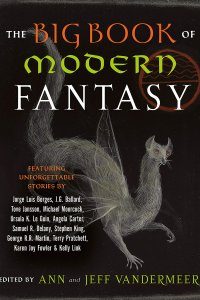Gary K. Wolfe Reviews By Force Alone by Lavie Tidhar
 By Force Alone, Lavie Tidhar (Head of Zeus 978-1838931278, £18.99, 516pp, hc) March 2020. (Tor 978-1-250-75345-8, $27.99, 416pp, hc) June 2020.
By Force Alone, Lavie Tidhar (Head of Zeus 978-1838931278, £18.99, 516pp, hc) March 2020. (Tor 978-1-250-75345-8, $27.99, 416pp, hc) June 2020.
Sometimes while reading a Lavie Tidhar novel, there comes a point when you feel like he’s grabbed the wheel, grinning as he drives you aggressively into oncoming traffic and somehow pulls off moves that by all rights ought to be fatal. That’s never been more the case than in his dark and manic but thoroughly researched reinvention of Arthurian legends, By Force Alone – which, among many other things, first introduces us to Arthur as a teenage drug dealer in London and Lancelot as a kung fu master from the East, trained by none other than Joseph of Arimathea. Guinevere, for her part, runs a Birds of Prey-style girl gang, and Merlin is at once a half-human shapechanger (and occasional werewolf) and a rationalist who insists that magic is simply ”the understanding and manipulating of nature.” Secondary characters include most of the familiar names from Arthurian lore – Galahad, Kay, Nimue, Pellinore, Gawain, etc. – and surprise guest appearances by everyone from Grendel and his mom to the witches from Macbeth, and even a gaggle of leprechauns. Even that ancient Greek Antikythera mechanism shows up as a prop. As is increasingly the custom with K.J. Parker, Joe Abercrombie, and others, Tidhar has his characters speak in colorful contemporary vernacular (Merlin is told that the sword-in-the-stone business is ”the dumbest fucking thing I’ve ever heard”), much of it borrowed from gangster movies (”Don’t fucking move or your boy gets it,” ”It was the sort of offer you couldn’t refuse”), but even with nods to classic SF films (”Keep watching the skies,” ”attack ships on fire off the coast of Smyrna”) and, for good measure, T.S. Eliot.
Tidhar’s version of sixth-century Britain carries some oddly familiar overtones. They’ve suffered their own version of Brexit with the withdrawal of the Romans, infrastructure is collapsing, the economy in chaos, the government fragmented among competing kingdoms, and xenophobic fears of invading Angles, Saxons, and Jutes are rampant. The novel begins with the rise of Arthur’s father Uther, the birth of Arthur himself, and – significantly – the appearance of a comet, which Uther takes to be a dragon, thus naming himself Uther Pendragon. The fragments of the comet which fall to Earth will play an increasingly prominent role over the next several decades. We next meet Arthur as a young gang leader, running a hallucinatory drug called Goblin Fruit – actually kykeon, a kind of fungus-infected barley – and eventually deciding to unite the warring kings under his own leadership, which he accomplishes with all the efficient brutality of Michael Corleone taking on the Five Families (Arthur’s knights are even referred to as ”made men”). In traditional Arthurian episodic form, subsequent ”books” (there are fourteen in all, some quite short) relate the backstories of other major figures as they enter into Arthur’s circle. It’s not long before some distinctly SFnal elements begin to work their way into the mix, though. The fragments of that comet may be more than ordinary meteorites, and they may be radioactive (the Romans seem to have discovered radium), since those who work around them are somehow changed into mutatio, and there are rumors of old explosions so hot the sand was fused into glass. The mysterious, glowing zone around the impact, where Merlin’s powers are nullified, recalls nothing so much as the Strugatsky’s Roadside Picnic: reality may shift unexpectedly, and guides or ”crawlers” help visitors navigate the shifting and incomprehensible reality within: ”It’s like we’re ants, crawling on the hide of some massive beast,” explains Gawain, who is one such guide. Not surprisingly, these SF elements are woven into Tidhar’s versions of the grail quest and the wasteland.
If all this sounds like a wildly cavalier approach to the matter of Britain, with subtle and not-so-subtle allusions to contemporary politics and dialogue more suited to Samuel Jackson than to Tennyson, Tidhar makes it clear in an informed afterword that this has pretty much always been the case with Arthurian literature, from Geoffrey of Monmouth’s fabulations through the additions of Norman, French, and German writers, all the way down to Malory and eventually the Victorians (he stops short of mentioning Disney’s animated musical of T.H. White’s The Sword in the Stone, or other movie versions). In other words, By Force Alone – a phrase that recurs like a mantra throughout the narrative, reminding us that power is never really a matter of heritage or destiny – serves as a reminder that Arthur is a moveable feast, infinitely adaptable even to the era of Brexit and Trump. If Tidhar’s version seems pretty bleak, even as its endless inventiveness makes it undeniably exhilarating, that may simply be a reflection of where we all find ourselves these days.
Gary K. Wolfe is Emeritus Professor of Humanities at Roosevelt University and a reviewer for Locus magazine since 1991. His reviews have been collected in Soundings (BSFA Award 2006; Hugo nominee), Bearings (Hugo nominee 2011), and Sightings (2011), and his Evaporating Genres: Essays on Fantastic Literature (Wesleyan) received the Locus Award in 2012. Earlier books include The Known and the Unknown: The Iconography of Science Fiction (Eaton Award, 1981), Harlan Ellison: The Edge of Forever (with Ellen Weil, 2002), and David Lindsay (1982). For the Library of America, he edited American Science Fiction: Nine Classic Novels of the 1950s in 2012, with a similar set for the 1960s forthcoming. He has received the Pilgrim Award from the Science Fiction Research Association, the Distinguished Scholarship Award from the International Association for the Fantastic in the Arts, and a Special World Fantasy Award for criticism. His 24-lecture series How Great Science Fiction Works appeared from The Great Courses in 2016. He has received six Hugo nominations, two for his reviews collections and four for The Coode Street Podcast, which he has co-hosted with Jonathan Strahan for more than 300 episodes. He lives in Chicago.
This review and more like it in the June 2020 issue of Locus.
 While you are here, please take a moment to support Locus with a one-time or recurring donation. We rely on reader donations to keep the magazine and site going, and would like to keep the site paywall free, but WE NEED YOUR FINANCIAL SUPPORT to continue quality coverage of the science fiction and fantasy field.
While you are here, please take a moment to support Locus with a one-time or recurring donation. We rely on reader donations to keep the magazine and site going, and would like to keep the site paywall free, but WE NEED YOUR FINANCIAL SUPPORT to continue quality coverage of the science fiction and fantasy field.






Big fan of Tidhar here, and By Force Alone is as readable as everything he publishes, but while he intends the book to be a descent into the muck, it descended a bit too far for me with Galahad’s initiation. Of all the cultural references Tidhar makes, the truest one to the spirit of the novel is to Goodfellas–and while I can’t help but appreciate Scorsese’s ability to spin a yarn, when I watch that film I always feel a little soiled. And so it goes with this book. The way it goes with novels, is you should even like the antiheroes. But other than Merlin, there’s no-one remotely sympathetic here at all.